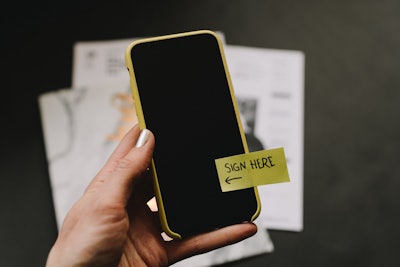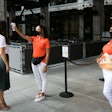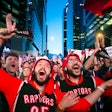
On Saturday, President Donald Trump held a campaign rally in Tulsa, Okla., at the BOK Center. Before attending the controversial event, supporters needed to agree not to hold the Trump campaign, the venue, or the management company liable if they contracted COVID-19.
 The waiver was posted on the rally’s registration page.
The waiver was posted on the rally’s registration page.
Known as an adhesion contract, a waiver of liability is “the language in a tiny font size on the back of printed tickets,” explains Steve Adelman, a Scottsdale, Arizona-based attorney who specializes in sports and entertainment events. Or “now it's the language on a website that has a disclaimer such as the Trump rally.” He adds that these kinds of waivers are typically ineffectual, largely unnecessary, and not generally enforceable.
Unlike other contracts, waivers of liability can't be negotiated. “It's just a ‘take it or leave it’ proposition,” says Adelman, who’s also vice president of the Event Safety Alliance. But because the attendee does agree to assume a certain risk, the courts interpret that as them having notice of that risk, while the event organizers have a legal duty to behave reasonably under the circumstances—in this case, that of a global pandemic. (Oklahoma is currently in phase three of reopening, which allows for public gatherings of any size as long as attendees practice social distancing.)
Matthew Saravay, president of event production firm Wizard Studios in Brooklyn, agrees that a waiver isn’t needed, but that it “does bring awareness to the risks involved in large gatherings in confined spaces at this point in time. But I also believe humans are aware of the risk they take by joining a gathering, whether they are physical distancing and wearing a mask or not.”
Even if an event attendee signs a waiver, they can still sue the organizers or the venue if they contract the coronavirus, but they most likely won’t win the case. “The reason almost every COVID-19-related injury or death claim will lose… has to do with proximate cause,” Adelman says.
For example, even though the organizers of the Trump rally didn’t follow CDC or WHO guidelines regarding social distancing at a large indoor gathering thus breaching their “duty of care,” Aldeman explains that “the plaintiff would also have to show that unlike all of the other places they went to during the two-week incubation period of COVID-19 that they contracted the virus only at BOK Center. That’s going to be really difficult,” he says, especially since Oklahoma is currently experiencing an increase in COVID-19 cases.
While these types of claims likely won’t be successful, Adelman predicts a much bigger problem going forward. “Insurers won't make any money covering claims caused by infectious disease including but not limited to COVID-19 ... so they're not going to write infectious disease coverage anymore.”
That means new or renewed insurance policies won’t cover the costs of claims, such as defense lawyers, arising from COVID-19. “So even non-meritorious claims will now have 'nuisance' value,” Adelman explains.
Businesses are currently lobbying Congress to grant them immunity from personal injury lawsuits related to the coronavirus pandemic. Adelman agrees that litigation relief is needed either on a state or federal level, but that businesses and venues also need to meet robust health and safety standards as part of any deal.
As for waivers, instead of adding in perfunctory language, Adelman suggests including helpful information and resources for attendees. “It’s so much better to just tell people what they can do, what they should do, ideally even what they must do to protect their own health and safety.”
Saravay echoes that sentiment, saying “the best we can hope for at this point is to follow state and local guidance from health officials and go with your gut instinct. We all know when something doesn’t feel right, it probably isn’t. It’s hard-wired into us."
Adelman cites the reopening of Disneyland as an example. The theme park’s website doesn’t include any specific waiver language—instead it states that “an inherent risk of exposure to COVID-19 exists in any public place where people are present” and links out to more details on the park’s reopening plans as well as CDC guidelines.
“What I recommend is clearly defining the social contract that exists between people who choose to gather,” Saravay says. “We should all agree that if we are sick or have recently been exposed to someone who is sick, we will not attend a gathering. We should all agree to have our temperature taken before entering a venue; we should all agree to wear a mask and stay six feet apart. And we should all agree to share our contact information in case, as a result of our gathering, we need to be contacted as part of contact tracing, and be prepared that at any point moving forward a person may need to quarantine for two weeks based on the actions they chose to engage in.”
He adds that “event organizers should over-communicate what the expectations are for attendees at an event, and [they] should ask for an affirmation from attendees that they agree to follow whatever guidelines are set forth.”



















